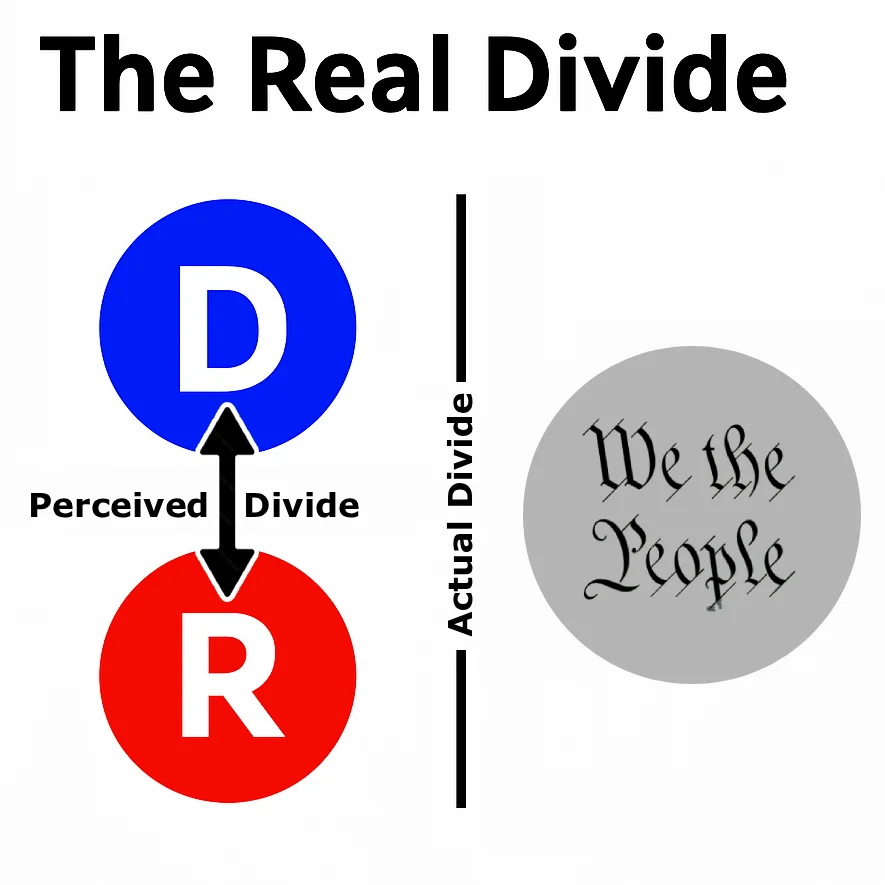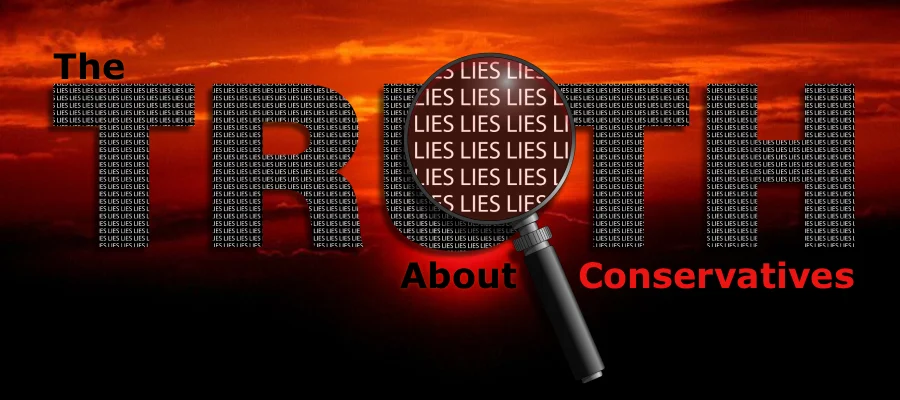8 Lies You Were Told About Conservatives
Public perceptions of conservatism are often shaped more by media caricatures and partisan echo chambers than by genuine understanding of the subject. In an age of soundbites and viral outrage, stereotypes take root easily. For many liberals, “conservative” has become a label loaded with assumptions about religion, education, wealth, or prejudice. Yet when we look closely, these assumptions simply don’t hold up. In fact, I’ll go as far as to say that you’ve been lied to about conservatives.
The persistence of these lies can be explained by several factors. Partisan media often have little incentive to portray the “other side” fairly; it is far easier to rally a base by demonizing opponents than by engaging them charitably. Social media reinforces this by rewarding outrage and oversimplification. Psychological factors also play a role: confirmation bias encourages people to notice only the stories that fit the stereotype, while ignoring those that don’t. The result is a distorted picture of what conservatism is and who conservatives are.
Let’s set the record straight. We’ll examine eight of the most common lies about conservatives and why they are false. Let’s dive in…
Lie 1: Conservatives are all Christians
While many conservatives identify as Christian, it is inaccurate to assume that conservatism is a religious monolith. There are conservative deists, Muslims, Jews, Hindus, and Buddhists, as well as individuals who hold no faith at all. Conservatism as a philosophy is not tethered to any single religion; it is concerned with preserving social order, limited government, and the principles that sustain a functioning society. Christianity has certainly shaped some of the history of conservatism in the West, but to assume that all conservatives are Christians erases the pluralism that exists within the movement. Furthermore, it ignores things like Article 11 of the Treaty of Tripoli and the fact that many of our Founders weren’t even Christian.
Lie 2: Conservatives are all religious
Similar to the previous lie, this lie is rooted in the association between conservatism and “traditional values,” which are often expressed in religious terms. Yet the principle of religious freedom cuts both ways: it includes not only the right to practice religion but also the right to abstain. Atheists, agnostics, and secular conservatives align with conservatism not because of faith, but because of their philosophical principles, such as respect for natural rights, adherence to constitutional order, and skepticism of radical social engineering. Conservatism does not demand faith; it demands an acknowledgment of limits and a respect for the institutions that make liberty possible.
Lie 3: Conservatives are all Republicans
Conflating conservatism with the Republican Party is another misunderstanding. Conservatism is a worldview; political parties are vehicles. At times, the Republican Party has reflected conservative values, but at other times it has absolutely drifted. In truth, many conservatives hate the two major parties and register as independents or libertarians, and some even align with smaller parties. Likewise, there are Republicans who have little interest in conserving anything and instead favor populism, anocracy, or technocracy. To reduce conservatism to a partisan identity strips it of its intellectual and historical depth. It also disregards the fact that many educated conservatives struggle with the Republican Party’s Federalist tendencies, which they often see as straying from core conservative principles.
Don’t take my word for it. Use your favorite AI system and simply ask: “Are Republicans and conservatives different?” Or, check out this link: What Is the Difference Between a Republican and a Conservative? In fact, I plan to write an article on this topic in the near future. Check back.
Bonus Lesson (Dropdown): The Problem of Federalism
One often-overlooked tension within American politics is the gap between conservatives and the Republican Party on the issue of federal power. Conservatives, by principle, generally favor limited government, limited regulation, local control, restrained authority, and maximum freedom for individuals and communities. Republicans, however, have a very long record of not only accepting but also expanding federal power when it serves their purposes.
As a strategy, some Republicans attempt to confuse conservatives into supporting big-government measures (more laws, more policing, more bureaucracy) while still proclaiming allegiance to ‘small government’ ideals. If there ever was a lie to be aware of, that’s the one. Even when in control of Congress or the presidency, they have rarely made significant moves to reduce the size or scope of government. That’s a clue.
This inconsistency frustrates many educated conservatives. If the goal of conservatives is genuinely smaller government, then federal expansion (whether it comes from the right or the left) remains a threat to the Constitution and Bill of Rights. From a conservative perspective, Big government is big government, regardless of what letter is next to their name.
Think about it. On the left, Democrats, communists, and socialists advocate overt centralization. On the right, Republicans too often defend their own brand of federal overreach. What’s the difference if big government and fewer liberties are the outcome? Ultimately, this means the Republicans, Democrats, Socialists, and Communists all have a lot in common. Big Government tendencies, though arising from different philosophies, converge in expanding the federal state at the expense of local authority and personal liberty.
Of course, this is not new, and it shouldn’t come as a surprise. After all, the Republicans party began by going down that Federalist road. Abraham Lincoln himself dramatically expanded federal power during the Civil War, laying down precedents that still shape the relationship between states and the federal government today. Ironically, it was the Democrats who had a problem with that expansion because they thought it violated what our Founders envisioned. From that point forward, federalism has continued to evolve, regardless of which party is in power. For any American who values limited government, this history makes clear that neither major party has consistently defended its principles, and both hinder various liberties.
Note: While my tone and position here are sharp, I should convey that these truths should not pit Federalists against Conservatives. If anything, they highlight the need for partnership. Conservatives have a responsibility to remind Federalists that liberty must always set the boundaries of authority, just as Federalists remind Conservatives that order and unity are essential for the nation’s survival. Neither tradition can stand alone; both are necessary, and neither should see the other as an enemy.
Lie 4: Conservatives don’t like homosexuals
The existence of openly gay conservatives makes it impossible to claim that conservatism and homosexuality are mutually exclusive. This stereotype is reinforced by selective media coverage and by the vocal presence of some religious traditionalists. But reality is more complex. There are openly gay conservatives who have held high office or shaped public debate. Richard Grenell, who served as U.S. Ambassador to Germany and Acting Director of National Intelligence, is one example. Dave Rubin, a political commentator, openly identifies as gay while advocating for free speech and limited government. James Richardson, a GOP strategist, Lucian Wintrich, and Andy Ngo, outspoken conservative commentators, add to the list. In fact, organizations like the Log Cabin Republicans demonstrate that being gay and being conservative are not incompatible. Conservatives typically believe that an individual can do or be whatever they want so long as they are not violating the rights of another.
Lie 5: Conservatives don’t like trans people
Much like the lie surrounding homosexuality, this narrative paints with a brush too broad. There are, in fact, plenty of transgender conservatives, which just proves that gender identity does not predetermine political philosophy. Granted, policy disagreements about gender identity in sports or healthcare are real and should not be dismissed, but they do not mean all conservatives reject transgender people. Caitlyn Jenner, one of the most famous trans public figures in the world, has aligned with conservative causes. Blaire White, a transgender commentator with a large online following, critiques leftist approaches to gender while openly embracing conservative values. Jordan Willow Evans, a Republican elected official in Massachusetts, is openly transgender and conservative. And the list goes on. These are just a few examples, but they demonstrate that gender identity and conservatism are not mutually exclusive. Again, be and do whatever you want; just don’t hurt others or force it onto someone else. That’s liberty!
Lie 6: Conservatives Are Uneducated — and Have No Colleges
The caricature of conservatives as backward or poorly informed is one of the most common, yet it is demonstrably false. Conservatism has a deep intellectual lineage, from Edmund Burke’s reflections on the French Revolution to William F. Buckley Jr.’s debates in the 20th century, to modern scholars in law, economics, and political science. Today, conservatives can be found across every educational stratum: Ivy League professors, skilled tradesmen, engineers, medical doctors, and entrepreneurs. To dismiss conservatives as “uneducated” is to ignore not only their presence in elite institutions but also the reality that education takes many forms beyond university degrees. Of course, “conservatives in academia” is a complex issue that we could discuss, but that’s an entirely different article.
Ironically, when the education debate turns to bias and indoctrination, the focus is almost always on progressive dominance in state universities. Yet the reality is that conservative education (from the thousands of private Christian schools to the network of colleges and universities shaped by traditional values) is far more extensive than critics admit. It is not a fringe but a parallel system, serving millions and forming a crucial part of America’s intellectual and cultural balance. The misrepresentation of this system is likely no accident. By framing higher education solely through the lens of progressive state schools, critics ensure that conservative options are marginalized, dismissed, or caricatured as illegitimate. This misdirection not only weakens conservative influence in education but also erodes support for the very institutions that preserve a conservative intellectual tradition.
Lie 7: Conservatives are all wealthy or privileged
I’m sure most would wish they were, but this lie emerges from the image of country-club Republicans or wealthy donors who support conservative causes. Yet conservatism is not the exclusive property of the wealthy (or Republicans). In reality, many conservatives come from working-class families, rural communities, or middle-class professions. In fact, much of the conservative movement has historically been rooted in the concerns of ordinary people who wish to preserve stability, opportunity, and community. Wealth is not the determinant of conservatism; values are.
Lie 8: Conservatives don’t care about minorities
Perhaps the harshest accusation is that conservatives are indifferent to or hostile toward minorities. This claim ignores the fact that many minorities themselves are represented within conservatism. Black conservatives, such as Thomas Sowell and Clarence Thomas, as well as Hispanic conservatives like Marco Rubio and Susana Martinez, and leaders from diverse backgrounds, demonstrate the diversity of thought within the movement. Conservatives often emphasize individual responsibility, equal treatment under the law, and skepticism toward identity politics. To many, this is not neglect but a principled commitment to treating people as individuals rather than as representatives of a group.
Here’s something interesting to think about. If you believe that all Christians are conservatives, and all conservatives don’t care about minorities, then how do we reconcile the inclusion of millions of Catholic Hispanics here in the United States? Interesting thought, isn’t it?
What Conservatism Really Is
So, what are conservatives? Well, they are not a uniform block of Christians, Republicans, or wealthy elites. In reality, they are a diverse group of individuals who seek to preserve the framework established in 1776 by the classical liberals who founded the United States: a republic based on liberty, limited government, and ordered freedom. Of course, to truly understand conservatives, one must first set aside the lies and listen to what they actually believe. Next, you must understand that the term has been hijacked to further confuse the populace.
Why These Lies Persist
If these lies are so clearly false, then why do they endure? Who does it serve when people believe such nonsense? Well, part of the answer lies in partisan incentives and federalist education. For liberal media and activists, portraying conservatives as uneducated, bigoted, or monolithic is a way to delegitimize their arguments without addressing them. It is easier to dismiss an opponent as hateful than to grapple with their reasoning.
It should come as no surprise that federalist education portrays federal initiatives and actions as inherently positive. Textbooks frequently present the consolidation of federal authority as “progress,” while minimizing the costs to state sovereignty, local autonomy, and individual liberty. By framing expansion as necessary for unity or modernization, the system normalizes centralization and conditions students to view bigger government as both natural and desirable. In doing so, it subtly encourages students to internalize federalist ideology as part of their own identity.

Social identity is another factor worthy of exploration. People derive a sense of belonging from their political tribes, and defining the “other” in negative terms strengthens group cohesion. Lies about conservatives reinforce liberal group identity by creating a common adversary. However, the key point to remember is that if your only two options result in a bigger government, that’s a false choice.
Finally, there is the problem of selective exposure. News algorithms, curated feeds, and the psychology of confirmation bias ensure that people mostly see examples that confirm their existing beliefs. A viral clip of an extremist voice may be taken as representative of all conservatives, while counterexamples receive little attention.
For non-conservatives, this means the challenge is not simply to critique conservatism but to understand it. Recognizing the diversity and depth within conservatism does not require agreement, but it does demand honesty. To move forward, the lies must be set aside so that dialogue can replace caricature. In fact, you might ask yourself what everyone is trying to hide about this movement. Why would they lie to you about it? What are they afraid of?
I was recently asked what I thought the biggest problem in America was. Well, I truly believe it is a case of ignorance of ignorance. In other words, you don’t know what you don’t know, but you don’t know that you don’t know. If you want to break free, you must cultivate genuine curiosity and be willing to admit to yourself that perhaps you don’t have all the answers. Only then can you begin to see past the stereotypes and lies that divide us. The health of a republic depends not on blind certainty but on a citizenry willing to question, to learn, and to pursue truth even when it challenges their own assumptions.
Keep Learning! Check out “The REAL Problem is the Revolving Door“




